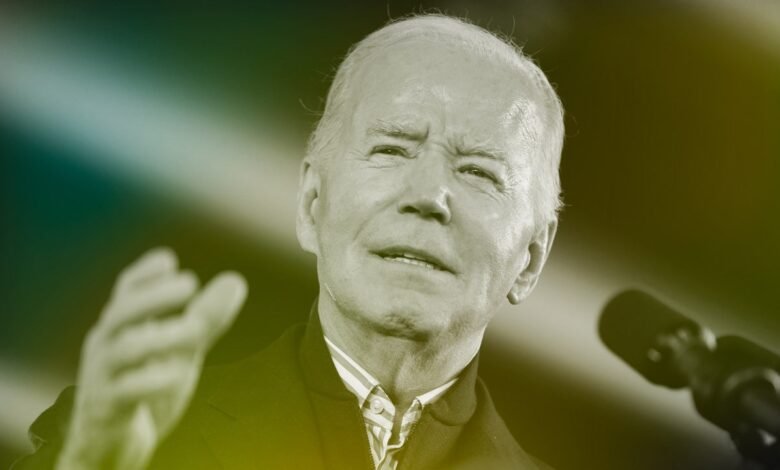Joe Biden Makes Saving Democracy the Center of His Campaign

An election year has begun, and the signs point toward a tight Presidential contest. Of the three national polls published since January 1st, two show Joe Biden trailing Donald Trump by one point in a head-to-head matchup; the third shows the pair tied. In a telephone call with reporters on January 2nd, the top officials in Biden’s reëlection campaign discussed their political strategy. They mentioned supporting abortion rights, mobilizing minority voters, and building an economy that benefits the middle class, but their overriding theme was that a Biden victory is essential to preserve American democracy.
“The choice for voters,” Julie Chávez Rodríguez, Biden’s campaign manager, said on the call, “will not simply be between competing philosophies of government.” She continued, “The choice will be about protecting our democracy and every American’s fundamental freedom. . . . We are running our campaign like the fate of our democracy depends on it, because it does.” Quentin Fulks, the deputy campaign manager, added, “Donald Trump tells us point blank—if he wins a second term, he will do everything he can to dismantle American democracy, strip Americans of their hard-fought and fundamental freedoms. . . . We should take him at his word.”
In the next few days, Biden will deliver two campaign speeches. On Friday, the day before the third anniversary of the January 6th attack on the Capitol, he will travel to Valley Forge, Pennsylvania, where George Washington’s Continental Army encamped in the winter of 1777-78. On Monday, he will speak in Charleston, South Carolina, at Mother Emanuel A.M.E. Church, one of the oldest Black churches in the southern United States, where, in June, 2015, a young white supremacist killed nine members of a Bible-study group.
Referring to Washington’s decision, in 1796, to relinquish the Presidency as the “ultimate precedent” of American democracy, Fulks said Biden will take the opportunity at Valley Forge to “lay out the stakes of this election.” Citing the 2015 shooting in Charleston and the January 6th attack, Fulks added that all Americans are concerned with rising political violence. He also said the Biden campaign is determined to mobilize Black voters who helped the President get elected in 2020: “Voters of color are the ones who have the most at stake in this election, and we need to make sure that every single one of them understands the choice in front of them.”
With Trump seemingly cruising to the Republican nomination, many nervous Democrats will welcome the President’s decision to sharpen his attacks on his predecessor. Although Biden has talked behind closed doors at fund-raisers about the threat that Trump poses, he hasn’t been making the case consistently on a public stage. That’s about to change.
The ramp-up of the Biden campaign’s efforts comes as Trump has been parroting his unfounded claims that the 2020 election was stolen and using increasingly incendiary rhetoric. In the run-up to Christmas, he pledged to his supporters that he would “root out the communists, Marxists, fascists, and the radical-left thugs that live like vermin within the confines of our country.” He also said immigrants are “poisoning the blood of our country.” Last week, he posted on his social-media account a word cloud featuring terms such as “power,” “revenge,” and “dictatorship”—words that voters used to describe Trump’s goals for a second term in a survey published by the Daily Mail. With his allies reportedly making plans to purge disloyal bureaucrats, and he himself talking openly about using the Justice Department to pursue his enemies, Trump’s authoritarian tendencies couldn’t be clearer.
As the highest democratic office holder in the land, Biden has an obligation to highlight them, and his campaign believes it will resonate with voters. Fulks pointed to a new Washington Post poll that indicated that more than half of Americans believe the January 6th assault on the Capitol was an “attack on democracy that should never be forgotten.” From a strategic perspective, the Biden team is trying to frame the campaign as a binary choice rather than a referendum on the Biden Presidency. (Biden often does this himself, and has said, “Don’t compare me to the Almighty—compare me to the alternative.”) The President’s political advisers are well aware of his low job-approval ratings and concerns about his age. Their argument is that the momentum will start to shift once voters are faced with a concrete choice between another four years of Biden and a second Trump Presidency in which the latter’s desire for revenge would be unleashed, and his control over the Republican Party in Congress would be virtually complete.
That could well be the case—in elections in 2022 and 2023, Democrats did better than expected after highlighting Republican extremism—but no President running for reëlection can rely exclusively on the toxicity of his opponent. They also need a positive message on bread-and-butter issues like jobs, health care, and the cost of living, as poll after poll indicate that these are the issues many Americans consider most important.




